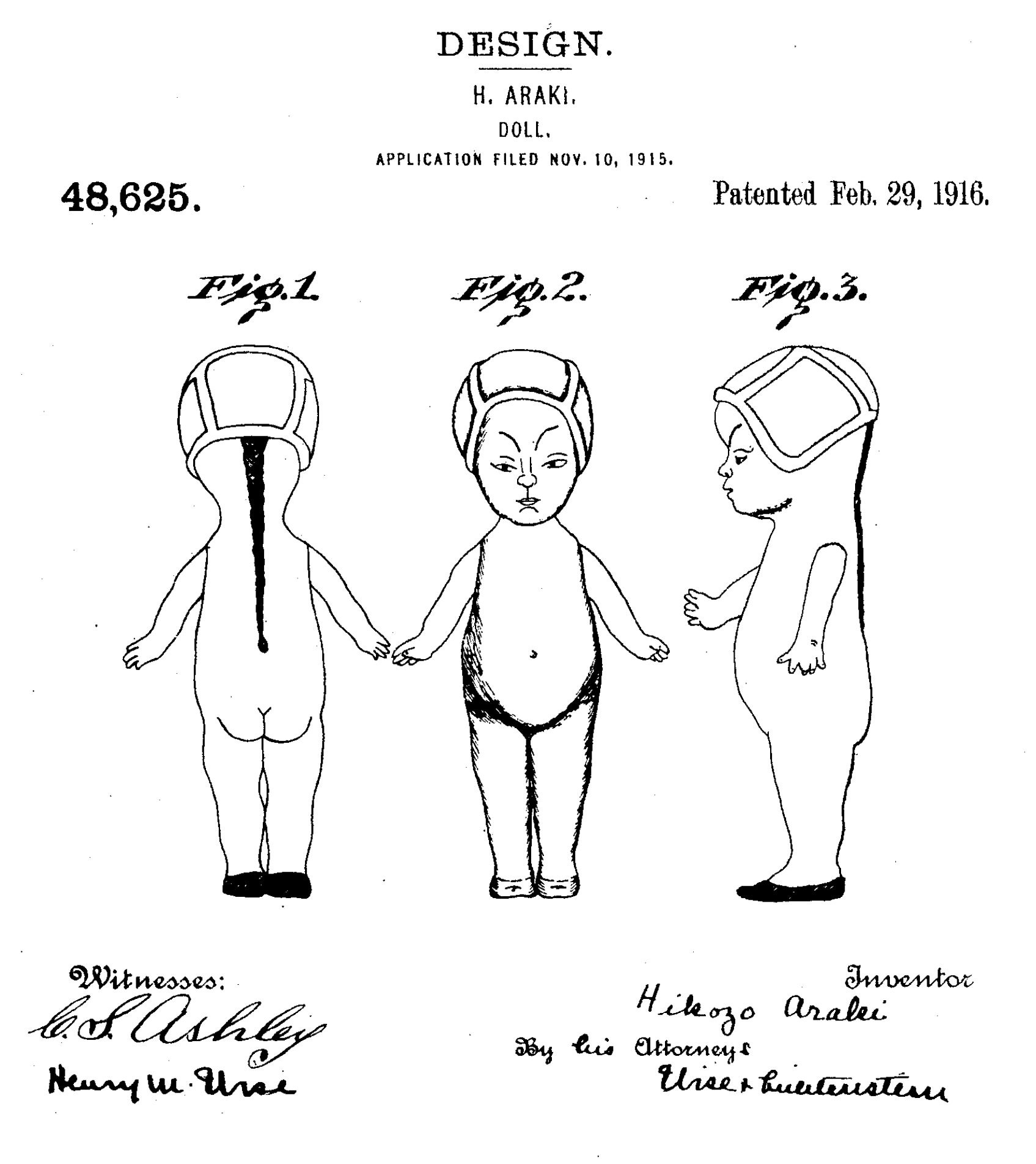The Morimura Brothers, Ichizaemon Morimura VI and Toyo Morimura, established Morimura Gumi in 1876 in Tokyo, Japan. This company was the precursor to Morimura Brothers, Inc., which became a significant trading company, especially in ceramics and other goods. The initial purpose of Morimura Gumi was to participate directly in international trade to benefit Japan’s economy, which was losing wealth through unfavorable trade terms imposed by foreign merchants at the time (Morimura Co.) (NGK NTK) (Noritake).
The Morimura brothers expanded their business by opening the retail store Hinode Shokai in New York City in 1876, which later became known as Morimura Brothers in 1881. They initially focused on selling Japanese goods such as pottery, fans, and dolls. Over time, the company evolved from retail to wholesale, particularly exporting ceramics and porcelain (Wikipedia) (NGK NTK).
Morimura Brothers Beginnings
When Japan discarded her policy of isolation it was Ichizayemon Morimura. His birth place and year is disupted. One says he was born in Tokyo in 1837. Another says he was born in Old Yedo in 1839. They claimed he saw clearly that if Japan was to take her place among the nations of the earth she must lay firm and strong the foundation of foreign commerce. To this end he sent his brother to America in the early seventies to learn at first hand the possibilities that lay on this side of the Pacific. So read an article in the September 18 issue of the Crockery & Glass Journal.
Their first place of business for the Morimura Brothers opened in New York in 1878.
Morimura first visited the United States one year earlier in 1877 during travels for the purpose of attending the Paris Exposition that same year.
The Bank of Japan
In 1882 Morimura was made the president of the Bank of Japan.
The London and China Telegraph 1890
The Morimura Brothers along with M. Tashiro and M. Takazavagi were named by the London and China Telegraph in 1890 as those of the First Japanese Trading Company. The Telegraph wrote that they were members Japanese Club in New York that had been established back in 1875.
Morimura Arai – Silk
In 1884 the Morimura brothers established Morimura Arai to develop the raw silk business with Japan, later establishing the Morimura Bank in Tokyo in 1897.
Toyo Morimura passed away in 1899.
Harry Tetsuka
In 1901 Harry Tetsuka (1867-1919) became general manager of Morimura Brothers.
Customs Undervaluation Lawsuit 1911
In 1911 newspapers reported legal court cases and disputes regarding a practice of undervaluation of their imports into the USA. They reported that year that America was beaten out of millions of dollars by the Morimura Brothers of Japan. Then later in 1912 papers reported the case raised concerns about the need for more workers at the appraisers’ office at customs in San Francisco. In March of 1912 they reported that the government had to refund $100,000 to the brothers, but this was appealed due to investigations of their imports both in San Francisco and to Seattle. An investigator was sent to Japan to look into their exports out of Japan.
1913 Advertisements
An ad from the New York JAPAN review for August 1913 issue reads, “MORIMURA BROTHERS, Largest Japanese House in U. S. Everything in Japanese Goods & Novelties; 546-548 Broadway New York; Chicago at 220 South State Street; Boston at 144 Congress Street.”
Later in October the publication announced, “Mr. Yasukata Murai, a prominent Japanese business man and general manager of Morimura Brothers of New York City, has returned from Japan.”
Baron Morimura
In 1915 the Emperor of Japan awarded Ichizayemon Morimura the title of Baron.
Noritake China
In 1919 they provide an address of 53-55-57 WEST TWENTY-THIRD ST in New York in the Crockery & Glass Journal (vol. 90. Jul-Dec) with a full page color advertisement. In August of that year their full page ad announces, “NEVER IN OUR HISTORY HAS THIS DISPLAY OF ‘NORITAKE’ CHINA BEEN MORE IMPRESSIVE, THERE BEING NUMER- OUS NEW EFFECTS IN DESIGN, COLOR AND SHAPE DISTINCTLY DIFFERENT FROM FORMER YEARS.”
January of 1923 Morimura features a full page ad for toy teasets in Playthings magazine (p. 61) offered at their New York address.
Two Deaths in 1919
Ichizayemon Morimura passed away on Thursday, September 11, 1919, at the age of eighty two in Tokyo. One month later Harry Tetsuka died on October 11.
Morimura Brothers’ Doll Manufacturing
Doll Patents
Queue San Baby Patent
1916 – Hikozo Araki, of Brooklyn, New York, worked as Assignor to Morimura Brothers of New York, N.Y. The firm’s patent registration states that the firm was composed of Itchizaemon (Ichizaemon) Morimura, Yasukata Murai, and Sanehide Hirose. They applied for patent 48,625 on November 10, 1915, serial no. 60,794, with a term of 3½ years. The patent was granted February 29, 1916.
At that time Hikozo Araki, a subject of the Emperor of Japan, resided at 417 Monroe Street in the burough of Brooklyn, New York. Araki states that he invented a new ornamental doll design as shown in the illustration. Henry W. Urse, the attorney, signed for Araki.
Coleman’s Encyclopedia of Dolls claims this Hikozo applied for a patent was for their trademarked “Queue San Baby” in 1915. The USPTO record of this doll does not mention “Queue San Baby.” One might do a search on Theriaults auction house and find a listing #337 that shows four all bisque Asian dolls. In the photo, the tall one with the jointed legs and white hat has a red diamond sticker label on his front that reads “Queue San Baby.” It measures a little more than 4 cm. The other three similar dolls with stiff legs have a similar sticker but with
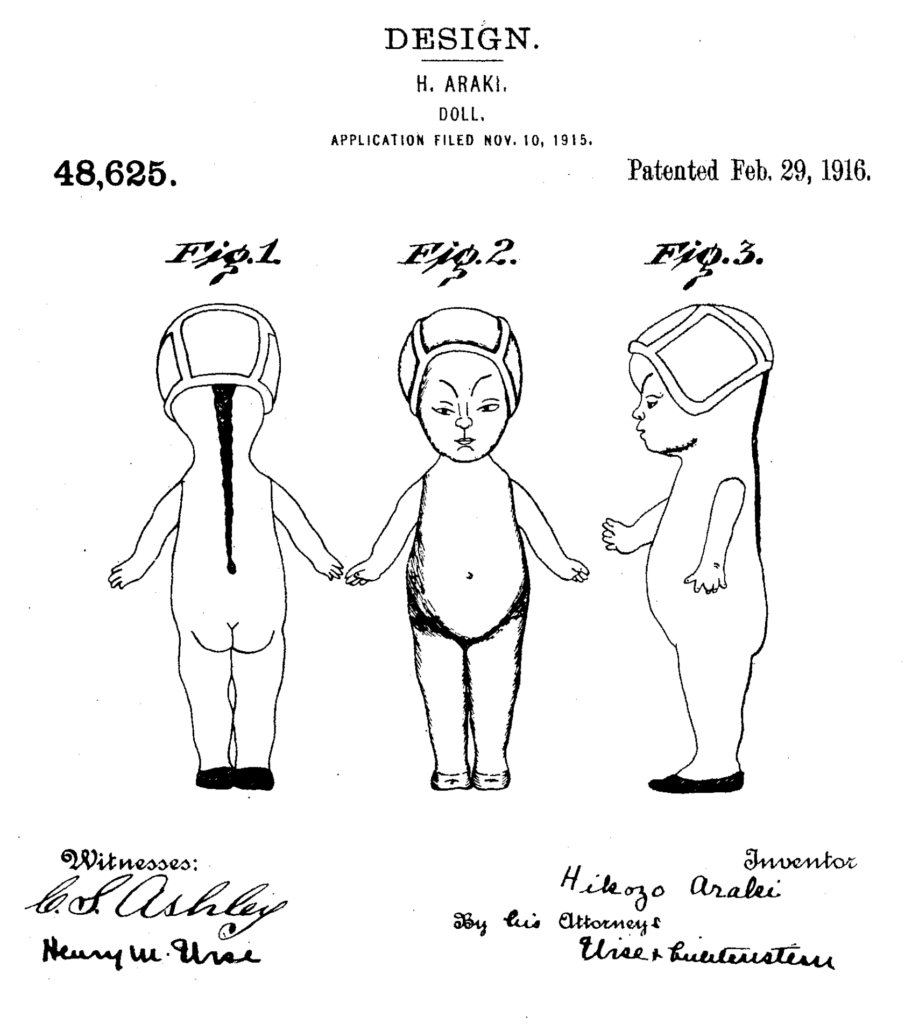
Langfelder Patent
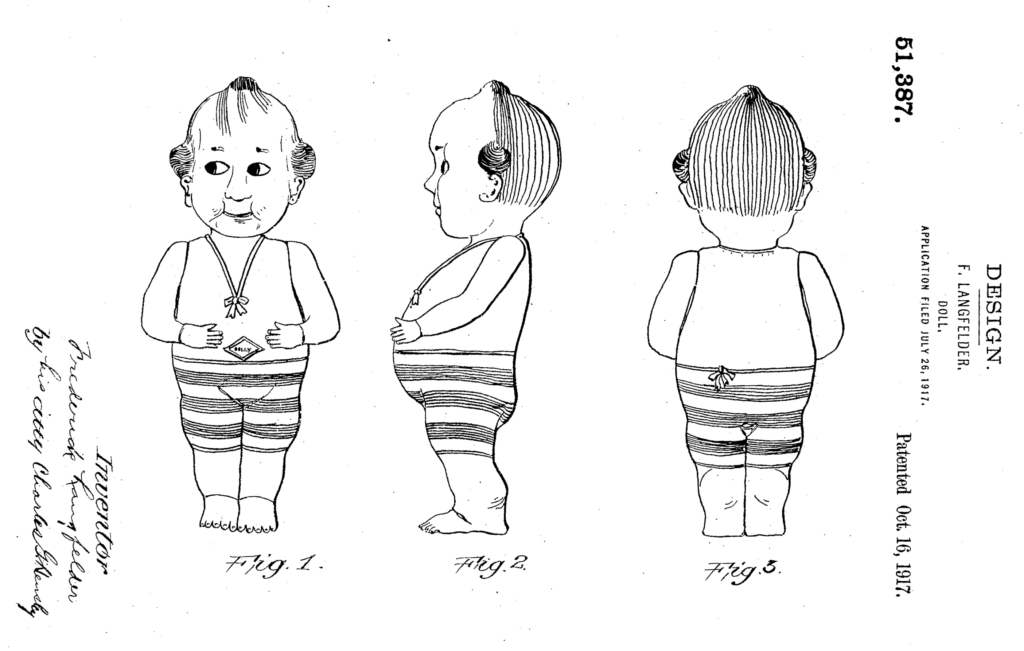
1917 – Frederick (Fred) Langfelder, a citizen of the United States, and resident of New York applied for a patent in 1917 working as ASSIGNOR to the Morimura Brothers of New York. Patent 51,387 (serial no. 182,987) was granted on October 16, 197 for a term of 7 years.
(See other American doll patents here.)
1918 Bester Dolls
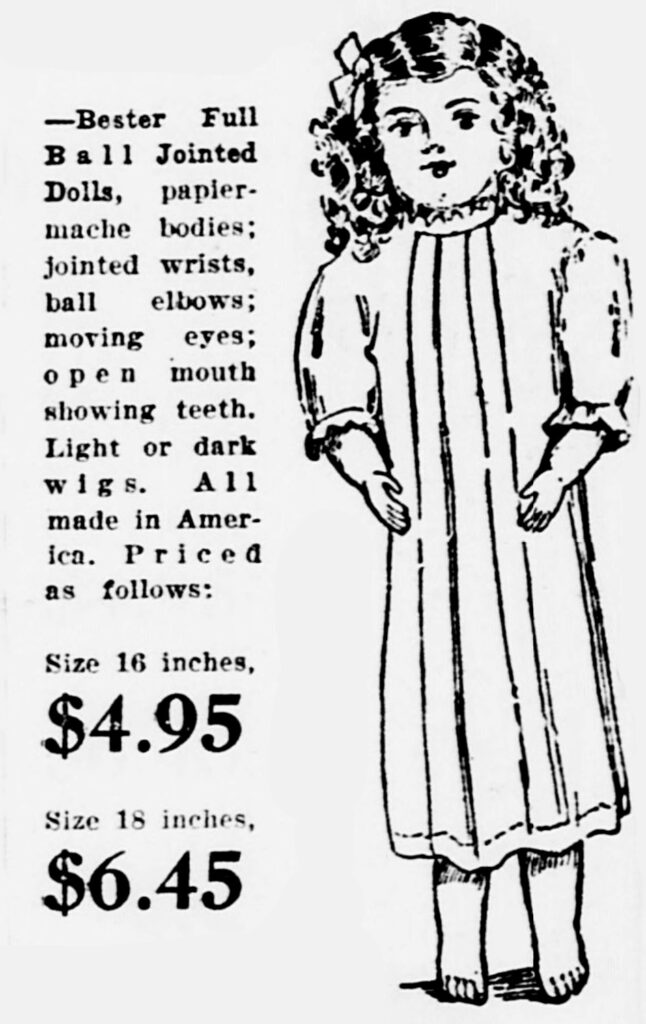
The Collector’s Encyclopedia of Dolls, by Coleman, that Morimura Brothers took over Bester Doll Manufacturing Co. in 1918 of Bloomfield, NJ. She cites no source for the claim. Bester Dolls sold ball-jointed dolls dressed by Katherine Rauser. Bester Dolls found today will say “Bester Dolls” on the back of the head.
Image shown from the Evening Star, Washington DC, November 07, 1919, Page 14.
In January 1921 TOYS published their ad for meeting at the Hotel Imperial during the toy fair as “BESTER DOLL MFG. CO. 393-395 High St. Newark, N.J. Jointed Dolls, Toy Canoes, Nursery Furniture, Wood Toys. Maurice Warner and Frank G. Lynch were named as representatives. One of their character dolls in 1921 was called “Addie.”
1919 Playthings Magazine Announcement
In September of 1919 Playthings Magazine wrote to its readers “Since European goods were shut out, no other country in the world had been able to produce a bisque head doll until Morimura Bros. after long and hard effort presented their wonderful line three years ago (1916).
Morimura Character Dolls
Playthings Magazine again announces dolls offered by the Morimura Brothers. In December of 1918 they present an advertisement for “Baby Ella” Character Dolls with a bisque head and moving glass eyes.
They also offered KIDOLYN kid body dolls with hip joints and jointed arms.
In 1919 they offered Baby Ella, Baby Rose, My Darling, First Prize Baby and more. Then in 1920 they added “My Sweetheart” and “Baby O’Mine.”
Langfelder
In 1921 the Pottery & Glass Salesman (v. 22) named Fred (Frederick) Langfelder as the manager of Morimura’s toy department. Langfelder is the one whose name was on the 1917 patent application.
Langfelder, Homma & Hayward
In 1922 of TOYS (v. 19 Jan-June) Langfelder, Homma & Hayward published a full page advertisement and message to its readers (see below): Bisque dolls resembling the German antiques but marked with the Morimura trademark most likely came out of the Langfelder working relationships with Germany and Japan.
Announcing Our 1922 Import Lines
In making this, our first annual announcement to the trade, we beg to state that we expect to continue the same general policy of fair treatment and prompt and satis- factory service that has been the principle of our predecessors in the Import Misc. Dept., of Morimura Bros., Inc.
We do not wish to accept any orders except those on which we are assured we can make prompt delivery. On account of low operating costs we can and will quote prices which will equal all competition and we believe we can do better for you than anyone else. Honesty, prompt service and fairness to our customers will be our aim.Japanese Goods: China Toy Sets-the largest and nicest line we have ever had to offer to the trade. Celluloid Dolls and Toys-China Limb Dolls and Bisque Dolls. All of these items, we believe, will of neces- sity have to come from Japan as no other country seems able to produce them in any quantity as yet. We will also show a complete range of Hallowe’en novelties, Santa Claus and Xmas Candy, box novelties and items suitable for favors-work box sets and silk lined lacquer work and jewel boxes-baskets, lanterns, Hinoki roping, and various novelties and toys of a miscellaneous character. On account of long time required for delivery, we advise early buying and all orders are taken “Subject to change in Tariff.”
German Goods: We state without reservations that we have made connections on German goods which are second to none. We only ask that you give us an opportunity to show you our merchandise and we welcome comparison in prices with anyone in the business. When we tell you we will guarantee our prices you must know we have the merchandise ready. On account of uncertain conditions in Germany and heavy demands for their merchandise, this guarantee is worth everything to you—then again, it is expected Congress may raise the tariff on toys and dolls-we can protect you against such an increase-we do not believe it necessary to argue further with anyone to show them how to save money in tariff in- creases and at the same time have the merchandise in stock ready for business.
We will show a complete range of dolls, toys, tree ornaments, mechanical toys, etc., both for the jobber and the retailer. We will also show a complete line of gray, fancy and colored rubber balls, both Domestic and Imported.
We invite your consideration of these lines for 1922 delivery before you place your orders we anticipate a shortage in Imported toys and dolls and advise early purchases.Langfelder, Homma & Hayward, Inc. (continuing Import Misc. Dept. of Morimura Bros.) 221-227 Fourth Avenue, New York
In 1924 Langfelder, Homma & Hayward, Inc. advertised in the Playthings Magazine “continuing Import Misc. Dept. of Morimura Bros., Inc. at 391 Broadway, New York for DOLLS AND TOYS” (American, German, Japanese, Favors, Novelties, and Baskets).
Morimura Brothers’ Doll Mark
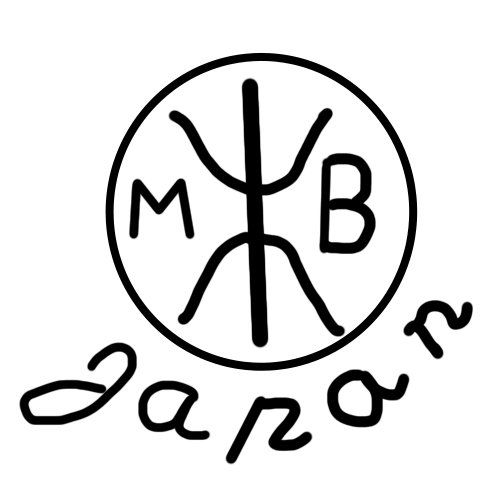
The mark shown on the left is an example of an incised mark found on some Morimura dolls.
